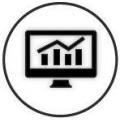Join the Qualtiative Methods Group for a conversation with Dr. Erin Kerrison about using mixed-methods to collect data about hard-to-reach populations.
Sign up for our weekly newsletter!
This is an archive of our past training offerings. We are looking to include workshops on topics not yet covered here. Is there something not currently on the list? Send us a proposal.
Come hear George Ng, Cyence Co-Founder & Chief Technology Officer, speak about practical quantitative data applications, and transitioning to industry and start-ups.
This three-part series will cover the following materials:
Part I: Introduction (Wednesday, October 12)
Are you trying to search for or clean up certain segments of text in your documents or data files, but it's taking hours to search and replace, because you have to type many slightly different versions of the keywords you're searching for?
The R for Data Science workshop series is a four-part course, designed to take novices in the R language for statistical computing and produce programmers who are competent in finding, displaying, analyzing, and publishing data in R.
Part 3: Analyzing Data
This three-part series will focus on how to maximize functions in Microsoft Excel, set up database-like structures, and build various kinds of reports. By the end of this series, participants will be able to import text data, perform basic mathematical operations and character-based functions, sort and filter data, and utilize pivot tables.
This four-part, interactive workshop series is your complete introduction to programming Python for people with little or no previous programming experience. By the end of the series, you will be able to apply your knowledge of basic principles of programming and data manipulation to a real-world social science application.
Part 3 Topics:
This introductory workshop is geared towards social scientists and digital humanitists who have data - spreadsheets, scanned maps, digital photos, etc - that they want to display on a map. We explore these tasks in CARTO, a versatile web mapping and geospatial analysis tool.
Pandas is a Python package providing fast, flexible, and expressive data structures designed to make working with 'relational' or 'labeled' data both easy and intuitive. It enables doing practical, real world data analysis in Python.
In this workshop, we'll work with example data and go through the various steps you might need to prepare data for analysis.
We plan to cover:
The Research in Progress Working Group is proud to present a panel of PhD candidates and students from diverse disciplines who will discuss the challenges and opportunities of conducting field experiments in the global south.
Join the Qualitative Methods Group for a conversation with Dr. Cybelle Fox about analyzing archival documents.
XML is a standard from which many encoding languages are created, and it structures much of the data on the Internet.
This three-part series will cover the following materials:
Part I: Introduction (Wednesday, October 12)
Students will learn the basics of cleaning, transforming, and formatting text data. They will pull specific elements out of text strings, and pull simple metrics from text data, such as word counts, syntax quantification via part of speech (POS) tagging, and sentiment polarity. Students will be introduced to topic modeling and word2vec methods.
The Literature and Digital Humanities Working Group would like to present the following talk as a follow up to 'Editions Inside of Archives: Literary Editing and Preservation at the Mark Twain Project' (Christopher Ohge).
The R for Data Science workshop series is a four-part course, designed to take novices in the R language for statistical computing and produce programmers who are competent in finding, displaying, analyzing, and publishing data in R.
Part 2: Clean and Tidy Data
This three-part series will focus on how to maximize functions in Microsoft Excel, set up database-like structures, and build various kinds of reports. By the end of this series, participants will be able to import text data, perform basic mathematical operations and character-based functions, sort and filter data, and utilize pivot tables.
This four-part, interactive workshop series is your complete introduction to programming Python for people with little or no previous programming experience. By the end of the series, you will be able to apply your knowledge of basic principles of programming and data manipulation to a real-world social science application.
Part 2 Topics:
Git is a powerful tool for keeping track of changes you make to the files in a project. You can use it to synchronize your work across computers, collaborate with others, and even deploy applications to the cloud. In this workshop, we'll learn the basics of understanding and using Git, including working with the popular "social coding" website, GitHub.
This workshop will provide a comprehensive overview of graphics in R, including base graphics and ggplot2. Participants will learn how to construct, customize, and export a variety of plot types in order to visualize relationships in data.






